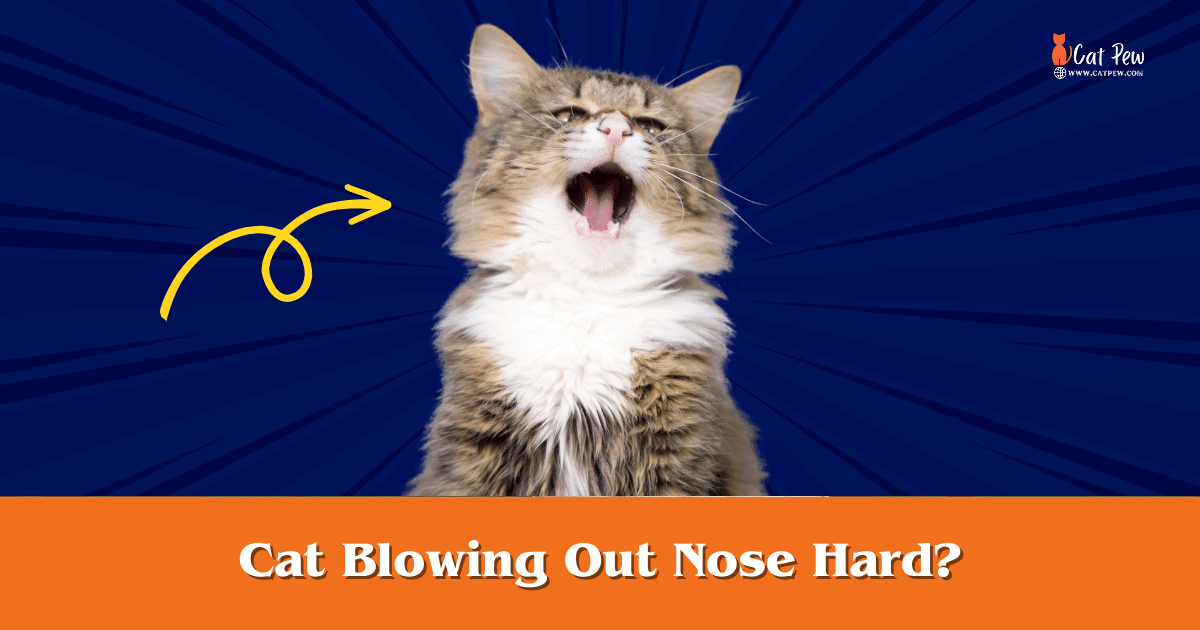Cat Blowing Out Nose Hard?
When a cat forcefully blows air out of its nose, it is likely due to irritation or a respiratory issue. This behavior can be a sign of allergies, a foreign object stuck in the nose, or an upper respiratory infection.
It is important to monitor the cat’s behavior and consult a veterinarian if the blowing out of the nose persists or is accompanied by other concerning symptoms. Understanding the underlying cause can help address the issue and ensure the well-being of the cat.
The Phenomenon Of Cats Blowing Out Their Noses
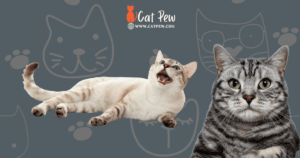
Ever noticed your cat blowing out its nose forcefully? It’s a peculiar behavior that has both intrigued and puzzled cat owners worldwide. In this blog post, we will explore the phenomenon of cats blowing out their noses and delve into the reasons behind this curious feline surprise. Let’s dive in!
What Is The Behavior Of Cats Blowing Out Their Noses?
When you see your cat blowing out its nose hard, it can be a fascinating sight. The behavior typically involves a sudden, forceful expulsion of air through the nostrils, creating a distinctive snorting or huffing sound. Cats may exhibit this action repeatedly, using a sharp exhalation to expel air with noticeable force. This behavior often catches owners off guard, as it can be unexpected and seemingly random. Cats may blow out their noses during various activities, such as playing, grooming, or even while resting. While it may seem unusual, this behavior is considered normal in most cases.
Understanding The Reasons Behind This Peculiar Feline Surprise
The reasons behind cats blowing out their noses can vary. Here are a few possible explanations:
- Clearing the nasal passages: Cats may blow out their noses to clear any obstructions or irritants from their nasal passages. It could be dust, pollen, or even a foreign object that triggers this behavior. By forcefully expelling air, cats attempt to rid their noses of any potential irritants.
- Expressing displeasure or frustration: Another possible reason for cats blowing out their noses could be to express their dissatisfaction or annoyance. Cats may use this behavior as a way to communicate their feelings, especially when they are less than pleased with a situation or interaction.
- Playfulness and excitement: Sometimes, cats blow out their noses as a reaction to excitement or during playful moments. It may serve as an expression of joy or anticipation, much like a human might let out a laugh or giggle when having fun.
The Frequency Of Cats Blowing Out Their Noses
The frequency at which cats blow out their noses can vary from one cat to another. Some cats may exhibit this behavior more frequently, while others may do it less often or not at all. It largely depends on the individual cat’s personality and the specific triggers or situations they encounter. It’s important to note that occasional nose-blowing behavior is generally considered normal in cats. However, if you notice a sudden increase in frequency or if it is accompanied by other symptoms like sneezing, nasal congestion, or discharge, it is advisable to consult a veterinarian to rule out any underlying health issues. In conclusion, cats blowing out their noses is an intriguing yet common occurrence. While the exact reasons behind this behavior may remain speculative, it’s generally considered to be a natural response to various stimuli.
By understanding this phenomenon better, cat owners can appreciate their feline companions’ unique ways of expressing themselves.
The Science Behind Cats Blowing Out Their Noses
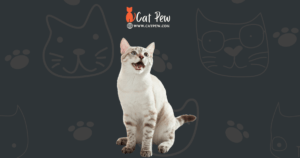
Cats blowing out their noses is a fascinating science behind their behavior. Discover the reasons behind why cats blow out their noses with force.
Exploring The Anatomy Of A Cat’s Nose
When it comes to understanding why cats blow out their noses hard, it’s essential to explore the intricate anatomy of their nasal passages. Cats have an extraordinary sense of smell, and their noses are designed to facilitate this remarkable ability. A cat’s nose is made up of several parts, including the external nostrils, nasal cavity, and turbinates. The external nostrils act as entry points for air, while the nasal cavity contains specialized tissues and olfactory receptors responsible for detecting odors. These olfactory receptors are incredibly sensitive and allow cats to pick up even the faintest scents.
Additionally, the turbinates, a series of bony structures covered in a moist, mucus-secreting membrane, help to filter, warm, and humidify the inhaled air before it reaches the lungs. Understanding the anatomy of a cat’s nose provides valuable insights into the science behind their nasal behaviors.
How Does The Sneezing Mechanism Work In Cats?
Sneezing is a common reflex in cats and serves several important functions. It helps to expel irritants, such as dust or allergens, from the nasal passages. Sneezing works by rapidly expelling a burst of air through the nose and mouth. When an irritant is present in the nasal cavity, it triggers the nasal mucosa to release histamines, which leads to the stimulation of the sneezing reflex. The cat’s diaphragm contracts forcefully, causing the air to be expelled rapidly. This mechanism helps to clear any foreign substances that might have entered the nasal passages, allowing the cat to breathe more comfortably. Sneezing is a natural defense mechanism that helps to keep a cat’s nasal passages clear and healthy.
Unraveling The Physiological Reasons For Cats Blowing Out Their Noses
Cats blowing out their noses hard can be attributed to various physiological reasons. Here are a few possible explanations for this intriguing behavior:
1. Dislodging Irritants: Cats may blow out their noses forcefully to dislodge irritants that have accumulated in their nasal passages. This behavior helps remove anything that might be causing discomfort or blockage, allowing the cat to breathe freely.
2. Clearing Congestion: If a cat is experiencing congestion due to a respiratory infection or allergies, blowing their nose hard can help clear the nasal passages. This forceful expulsion of air not only helps to remove excess mucus but also aids in opening up the airways for easier breathing.
3. Expressing Displeasure: Occasionally, cats may blow out their noses as a form of communication. It can be a way for them to express displeasure or frustration in certain situations. This behavior is often accompanied by other body language cues, such as flattened ears, a swishing tail, or a tense posture.
In conclusion, the science behind cats blowing out their noses involves understanding their nasal anatomy, the mechanism of sneezing, and the physiological reasons behind this behavior. By exploring these aspects, we can gain insight into the fascinating world of cats and their unique behaviors. So, the next time you see a cat blowing out its nose hard, you’ll have a better understanding of what might be happening.
Common Triggers For Cats Blowing Out Their Noses
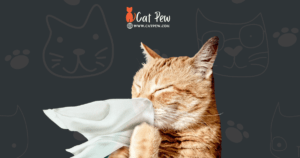
When your precious feline friend starts blowing out their nose hard, it can be quite concerning. However, several common triggers can cause cats to experience sneezing fits and nasal discharge. Understanding these triggers can help you identify the underlying cause and provide appropriate care for your furry companion.
Dust And Allergens: The Role Of Allergies In Sneezing Fits
Allergies are not only a bothersome condition for humans but can also affect our furry friends. Dust, pollen, mold, and other environmental allergens can trigger sneezing fits in cats. When these particles enter their nasal passages, the body’s natural response is to expel them through sneezing. While the occasional sneeze is normal, if you notice your cat repeatedly blowing out their nose after exposure to certain allergens, it may be an indication of an allergic reaction. In such cases, minimizing exposure to these allergens and consulting with a veterinarian for additional treatment options can help alleviate your cat’s discomfort.
Environmental Irritants: What Objects And Substances Can Trigger Sneezing In Cats?
Cats are curious creatures, and they often explore their surroundings with their sensitive noses. Unfortunately, some objects and substances they encounter can act as irritants, causing them to sneeze. Common environmental irritants include strong perfumes, cleaning products, cigarette smoke, dusty surfaces, and even certain types of cat litter. These irritants can cause cats to have frequent sneezing fits and may also lead to nasal discharge. By identifying and removing such irritants from your cat’s environment, you can help reduce the occurrence of nose blowing and ensure they breathe easier.
Sneezing Fits And Nasal Discharge: Identifying Respiratory Infections And Their Links To Nose Blowing
While occasional sneezing is considered normal for cats, frequent sneezing fits accompanied by nasal discharge can be a sign of a respiratory infection. Upper respiratory infections, such as the common feline cold, are caused by viruses and can lead to inflammation of the nasal passages and excessive sneezing. If you notice your cat blowing out their nose frequently, along with other symptoms such as coughing, lethargy, or loss of appetite, it’s essential to seek veterinary care promptly. A veterinarian can diagnose the underlying infection and prescribe appropriate treatment to help your cat recover swiftly.
In conclusion, being aware of the common triggers for cats blowing out their noses can help you understand if your furry companion’s sneezing fits are a cause for concern. By addressing these triggers and seeking veterinary attention when needed, you can ensure your cat stays healthy and enjoys a sneeze-free life.
Is Cat Blowing Out Nose A Cause For Concern?
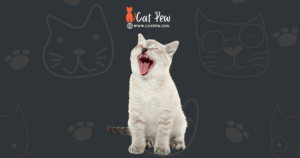
Is Cat Blowing Out Nose a Cause for Concern? If you are a cat owner, you may have witnessed your feline friend blowing out their nose forcefully at some point. While it may seem like a harmless and amusing behavior, you might wonder whether it is something to be worried about. In this blog post, we will discuss whether a cat blowing out the nose is a cause for concern and what you should do to ensure your cat’s well-being.
Differentiating Between Normal Sneezing And Potential Health Issues
Sneezing is a normal bodily function for cats, just like it is for humans. It helps them clear their nasal passages of irritants, such as dust or allergens. However, it is important to differentiate between normal sneezing and potential health issues, especially if your cat is frequently blowing out their nose. Here are some signs that indicate it may be more than just a simple sneeze:
- Excessive sneezing that persists for more than a few days
- Sneezing accompanied by nasal discharge, particularly if it is thick or discolored
- Noticeable difficulty in breathing or wheezing
- Persistent pawing at the nose or face
When Should You Be Worried About Your Cat’s Nose Blowing?
If your cat exhibits any of the above signs or if the blowing out of the nose is a new behavior for them, it is essential to monitor their overall health and seek veterinary advice if necessary. Persistent sneezing or nasal discharge can be indicative of various health issues, including:
| Allergies | Infections, such as respiratory infections or the feline herpes virus | Nasal polyps or tumors | Foreign objects lodged in the nasal cavity | Dental issues, leading to sinus problems |
Taking Appropriate Action For Your Cat’s Well-being
If you suspect that your cat blowing out their nose is a cause for concern, it is important to take appropriate action to ensure their well-being. Here are some steps you can take:
- Monitor their symptoms: Keep a close eye on your cat’s behavior and note any changes or worsening of symptoms.
- Provide a clean and dust-free environment: Minimize potential irritants in your cat’s living space by keeping it clean and free of dust or strong-smelling substances.
- Visit your veterinarian: If you are unsure or concerned about your cat’s health, it is always best to consult a veterinarian. They can perform a thorough examination and provide appropriate treatment if necessary.
- Follow the veterinarian’s advice: If your veterinarian identifies an underlying health issue, they will guide how to manage and treat it. It is important to follow their advice and administer any prescribed medication as instructed.
Remember, your cat’s well-being is a priority, and seeking professional help when needed is crucial for their health and happiness.
Tips For Managing Cats That Blow Out Their Noses

If you have a cat that frequently blows out their nose, it can be both worrisome and frustrating. Fortunately, there are several strategies you can implement to manage this issue and ensure your feline friend stays healthy and comfortable. In this article, we will explore methods for creating an allergen-free environment, preventing and minimizing sneezing fits, and seeking veterinary assistance when needed. By following these tips, you can help your cat find relief from nose blowing episodes and improve their overall well-being.
Creating An Allergen-free Environment For Your Feline Friend
To support a cat with frequent nose blowing, it is essential to create an environment that is free from potential allergens. Allergens such as dust, pollen, and certain chemicals can trigger sneezing fits in sensitive cats. Consider the following steps to minimize exposure to these irritants:
- Regularly clean and vacuum your home to remove dust and other airborne particles.
- Choose hypoallergenic bedding materials for your cat’s sleeping area.
- Use air filters or purifiers to improve the air quality in your home.
- Avoid smoking or using harsh chemicals around your cat.
By taking these precautions, you can create a safer and more comfortable environment for your cat, potentially reducing their nose blowing episodes.
Strategies For Preventing And Minimizing Sneezing Fits
While it may not be possible to eliminate sneezing fits in cats, there are strategies you can employ to minimize their occurrence. Implement the following techniques to help your cat experience fewer nose blowing episodes:
- Ensure your cat’s vaccinations are up to date to protect against respiratory infections.
- Keep your cat indoors to limit exposure to potential allergens and infectious agents.
- Provide a balanced and nutritious diet to support your cat’s immune system.
- Regularly groom your cat to remove excess fur and potential irritants.
- Use a humidifier to maintain optimal humidity levels in your home, as dry air can irritate your cat’s nasal passages.
By incorporating these preventive measures into your cat’s routine, you can minimize the frequency and severity of sneezing fits, improving their overall quality of life.
Seeking Veterinary Assistance For Persistent Nose Blowing Episodes
If your cat’s nose blowing episodes persist or worsen despite your efforts, it is crucial to seek veterinary assistance. Persistent sneezing could indicate an underlying health issue that requires professional evaluation and treatment. Consider the following factors when deciding whether to consult a veterinarian:
- The frequency and duration of the nose blowing episodes.
- Other accompanying symptoms such as nasal discharge or difficulty breathing.
- Any recent changes in your cat’s behavior or environment.
Your veterinarian will perform a thorough examination, possibly including diagnostic tests, to determine the cause of your cat’s nose blowing. They can then recommend appropriate treatment options to alleviate your cat’s symptoms and address the underlying issue. By actively managing your cat’s nose blowing episodes and seeking professional guidance when necessary, you can ensure your feline companion receives the care they need to live a healthy and happy life.
Frequently Asked Questions On Cat Blowing Out Nose Hard
Why Does My Cat Keep Blowing His Nose Out?
Cats may blow their noses due to allergies, infections, or irritants.
What Does It Mean When A Cat Blows Out Air?
When a cat blows out air, it typically means they are exhaling forcefully through their nose or mouth. This behavior can sometimes indicate irritation, contentment, or simply a way for the cat to clear its airways.
Should I be concerned if my cat frequently blows out its nose?
If your cat is otherwise healthy and showing no other concerning symptoms, occasional nose blowing is usually not a cause for concern
How can I help my cat if it seems uncomfortable while blowing out its nose?
Providing a clean and dust-free environment, regular grooming, and consulting with a vet can help alleviate discomfort.
Why does my cat huff through his nose?
Cats may huff through their noses as a way to communicate curiosity, excitement, or irritation
How Do You Unclog A Cat’s Nose?
To unclog a cat’s nose, gently wipe away any discharge with a soft, damp cloth. Use a saline solution to flush the nasal passages and help clear congestion. It’s best to consult a veterinarian for proper treatment and to address any underlying issues.
Why is my cat blowing snot out of her nose?
Your cat may have a respiratory infection or allergies causing excessive mucus production.
Should I be concerned if my cat is sneezing and blowing snot?
Yes, it’s important to monitor your cat and consult a veterinarian for proper diagnosis and treatment.
Can cats get colds like humans and blow snot out of their noses?
Cats can suffer from upper respiratory infections that cause symptoms similar to the common cold in humans.
What Can You Give A Cat For Congestion?
You can give a cat a humidifier, steam, or nasal drops to help relieve congestion.
Conclusion
Witnessing a cat blowing out its nose hard can be a fascinating and amusing experience. From the adorable scrunched-up face to the delicate sound that follows, it’s undoubtedly a moment worth capturing. Whether it’s a playful gesture or a reaction to something unexpected, these little nasal explosions bring joy to our lives. Cat Blowing Out Nose Hard
So, the next time you catch your feline friend blowing out their nose, take a moment to appreciate their quirky behavior and enjoy the simple pleasures they bring.

Winston
I'm Winston, the author of this feline-focused (Catpew.com) blog . My love for cats goes back to my childhood, when I spent countless hours playing with my family's tabby, Mittens. This furry friend instilled in me a deep appreciation for the unique personalities, playful nature, and unconditional love that cats offer.

